Middle-Aged Mom Prioritizes The Welfare Of Her Son's Dog And Gives It Back To Her Ex-Daughter-In-Law
Who gets the dog after a couple separates? Since divorce or separation can be such a stressful time, with many decisions to be made, determining who gets to keep the dog is often a difficult decision.
Divorcing couples cause hundreds of thousands of dogs to enter shelters every year. However, it's crucial to remember that these people aren't bad for rehoming their dogs.
After all, they're going through a traumatic experience, and more often than not, they're only thinking about what's best for their pet.
However, studies have repeatedly shown that a loving home where a dog has a stable routine is what's best for them.
Being surrendered to a shelter or having an uncertain future doesn't work for them all the time. Constantly changing routines can lead to misbehavior and anxiety for the pet.
Since canines are creatures of habit, the separation from their owners significantly disrupts their routine. Yet some ex-couples still manage a dog-share setup.
Others decide that only one will have the dog, and the other will be the pet sitter. But if the dog's welfare is the priority, the best way is to allow it to continue through the routine it's used to.
In today's post, we're looking at the story of a middle-aged woman who chose to decide what's best for her son's dog.
The original poster (OP) explains her family situation.
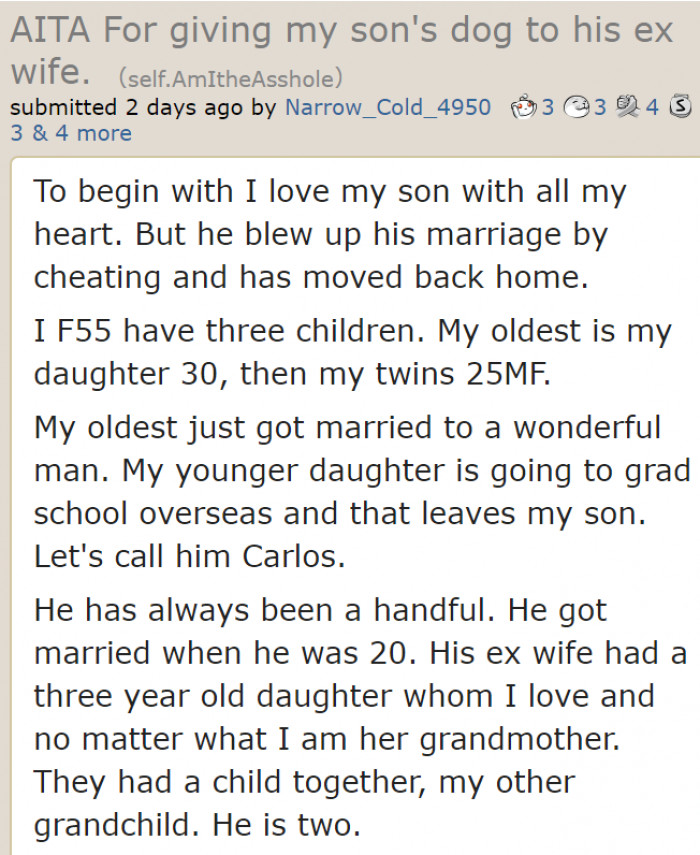
The fault of the OP's son

The dog isn't getting the care it needs.
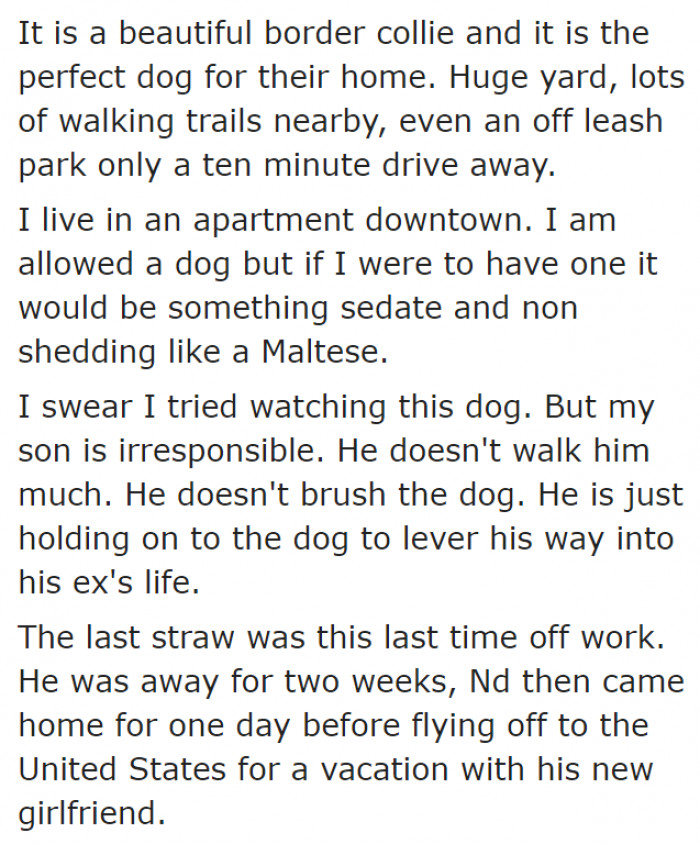
Understanding Family Dynamics and Pets
Dr. Michelle Lee, a family therapist, explains that the decision to prioritize the welfare of a pet over relational conflicts can be indicative of underlying family dynamics and emotional attachments.
Research shows that pets often serve as emotional anchors within families, and their well-being can become a focal point in relational conflicts.
The Intersection of Loyalty and Responsibility
This incident raises important questions about loyalty and responsibility in relationships. Research indicates that individuals often struggle to balance their commitments to family and their partners, which can lead to significant conflict. According to Dr. Michele Gelfand, a cultural psychologist, "When loyalty to family members conflicts with responsibilities to a partner, it can create emotional turmoil that affects decision-making." Furthermore, Dr. Alexandra Solomon, a relationship therapist, emphasizes that "Navigating these loyalties requires open communication and a willingness to address underlying feelings." These insights highlight the complexities involved in prioritizing relationships.
That's why the OP decided to give back the dog to her ex-daughter-in-law.
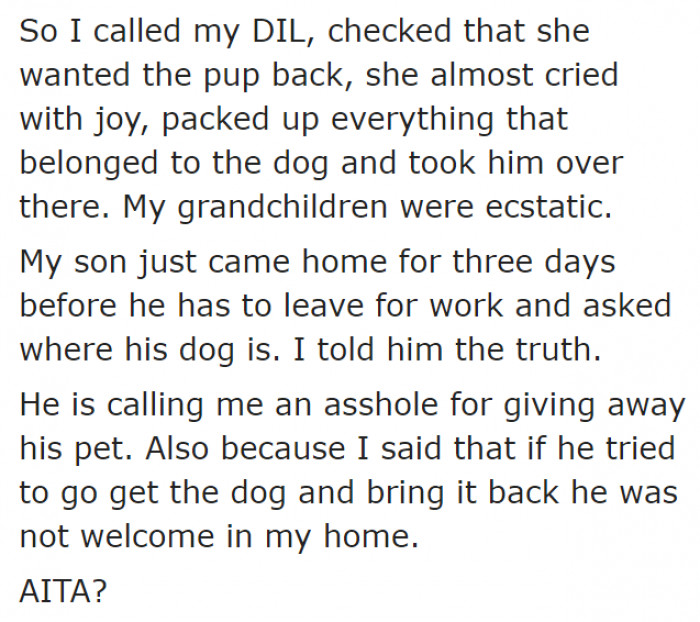
The OP's son only took the dog for a selfish reason.
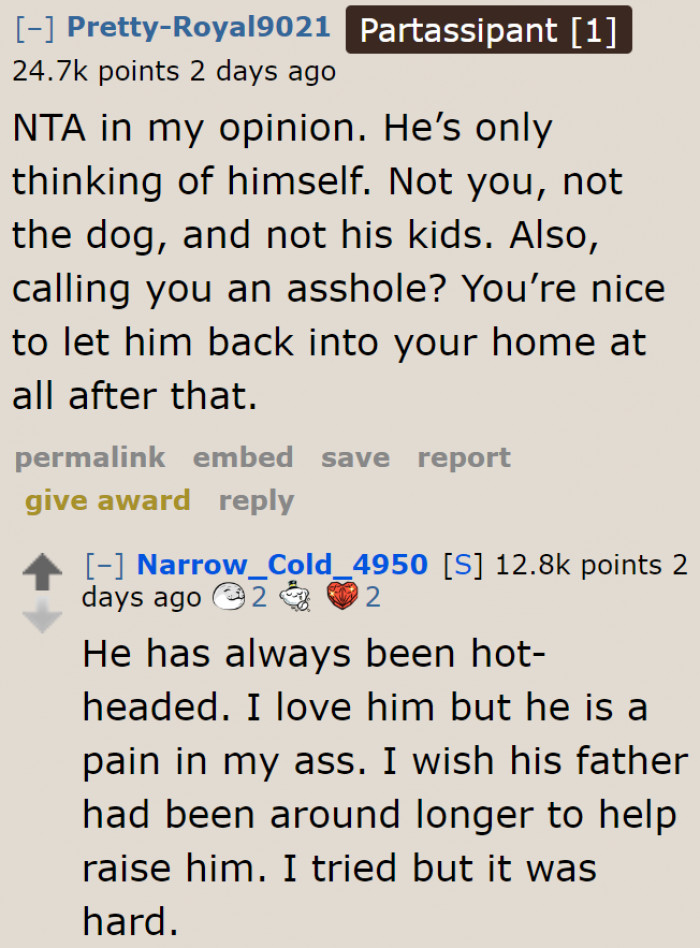
Tough love

Studies in family psychology indicate that when parents prioritize the needs of pets, it can signal deeper issues related to emotional support and attachment within the family unit.
This dynamic can complicate relationships when differing values around pet care emerge.
In this case, the mother's decision to prioritize the dog's welfare over her son's feelings may reflect deeper issues of loyalty and attachment. A family therapist notes that navigating these complex emotions requires clear communication and a willingness to explore underlying motivations.
Understanding these dynamics can help families make decisions that honor both loyalty and responsibility.
Redditors applauded the OP for what she did.
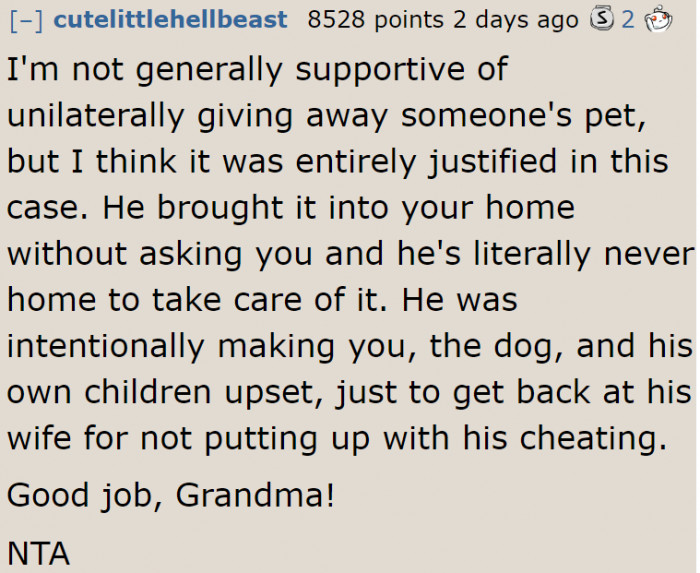
In the end, the Border Collie
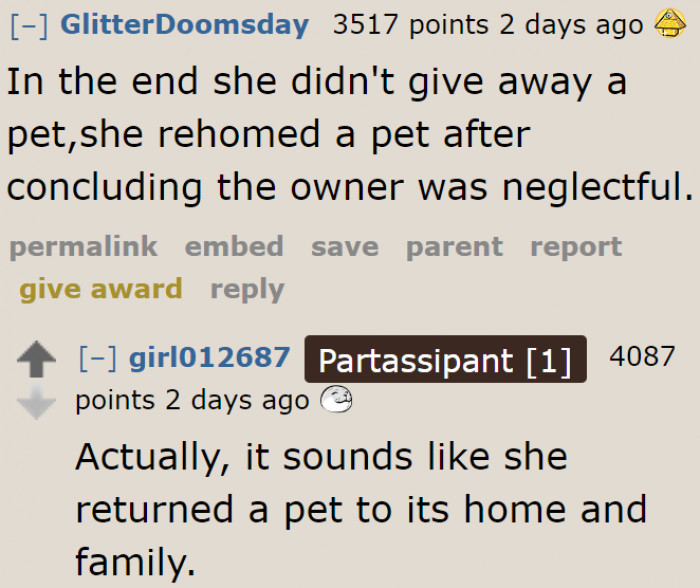
You can clearly see how much the mom loves her son despite him being quick-tempered.
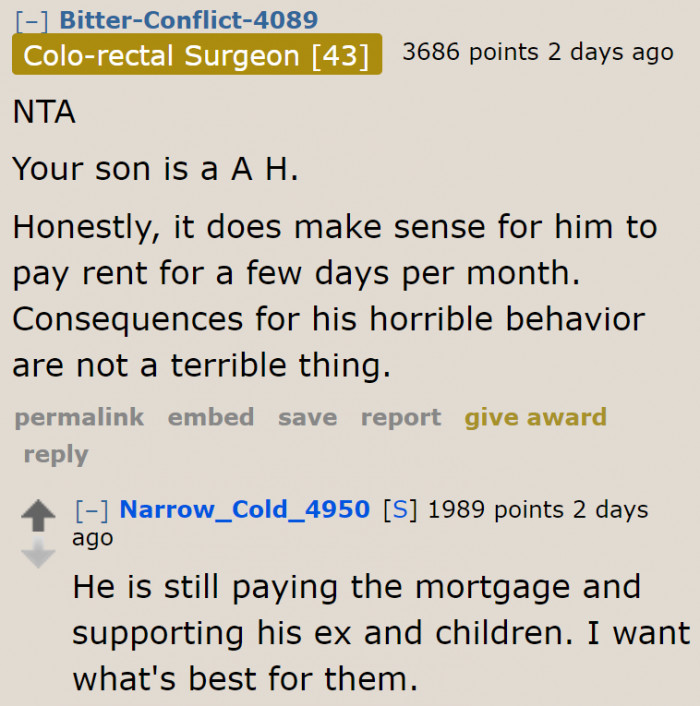
The Role of Emotional Attachment
According to attachment theory, the emotional bonds formed with pets can parallel those with human family members.
Research indicates that individuals often experience grief and loss when a pet is relinquished, reflecting the depth of these relationships.
Prioritizing Relationships
This scenario underscores the importance of prioritizing relationships in decision-making processes. Research suggests that individuals who prioritize their relationships tend to experience greater emotional well-being and satisfaction.
In this case, fostering open dialogue about the dog's welfare and the impact on family dynamics can promote healthier decision-making.
Redditors think that it's time for him to move out and learn responsibility.

It's not his pet because he's not caring for it.
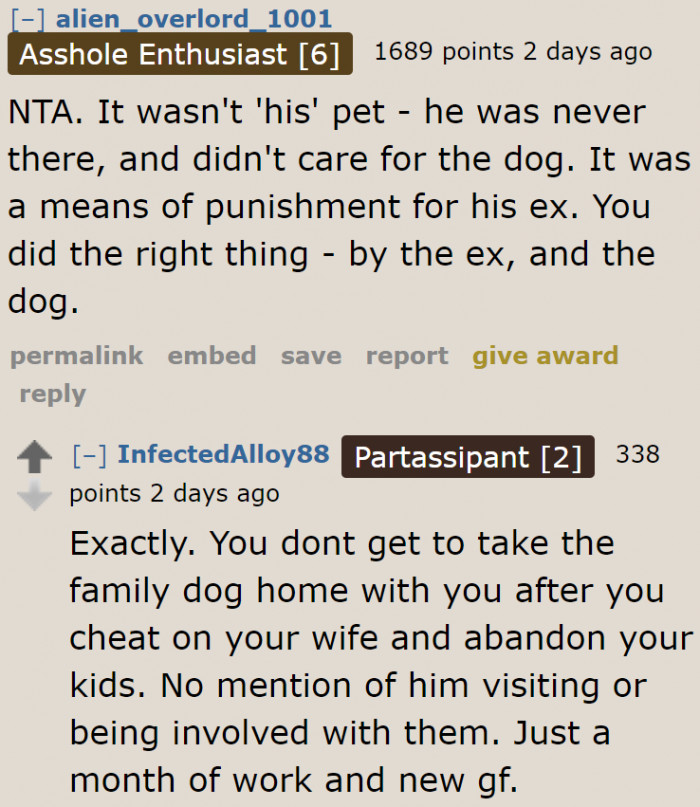
The mom did the right thing.
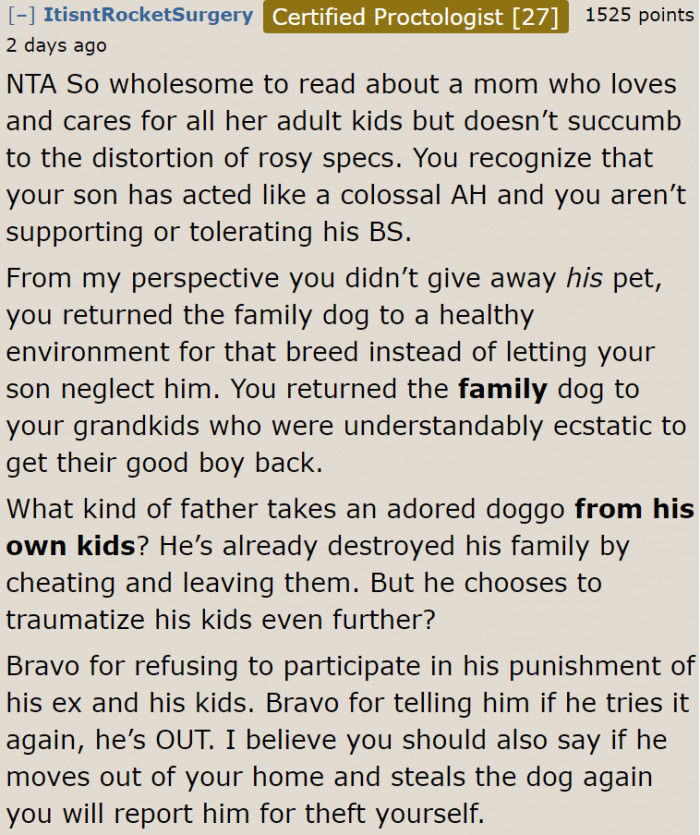
Families facing such conflicts should engage in open conversations about the emotional significance of pets.
Encouraging each family member to express their feelings can foster understanding and compassion.
Families should engage in discussions that clarify the values and responsibilities associated with pet ownership. Research indicates that shared values can enhance family cohesion and reduce conflicts, ultimately leading to healthier relationships.
Establishing a shared framework for decision-making can help families navigate complex emotional landscapes.
The man needs to grow up. And it looks like tough love is the only way.
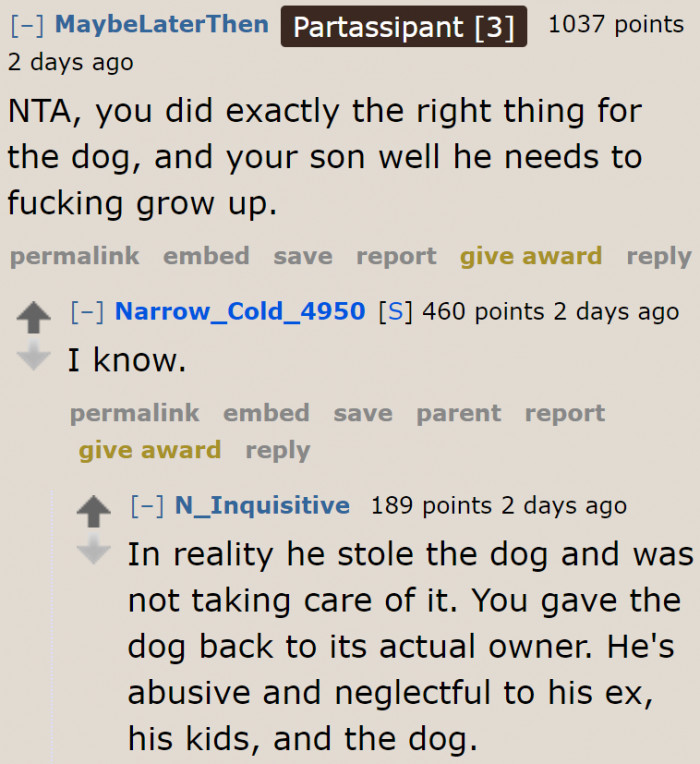
The way the son treats his dog is equivalent to abandonment.
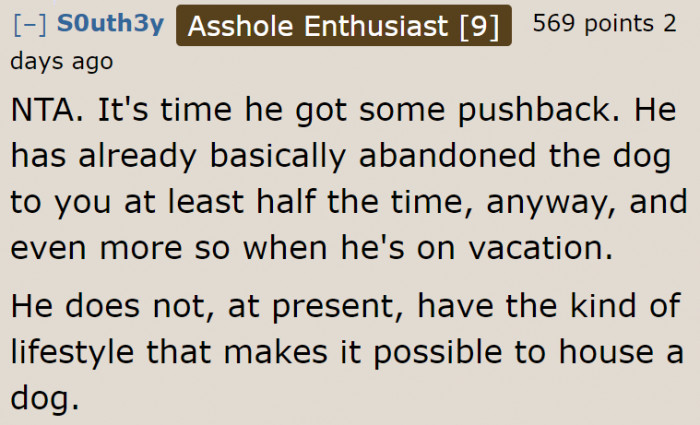
What the son did is a huge a-hole move.
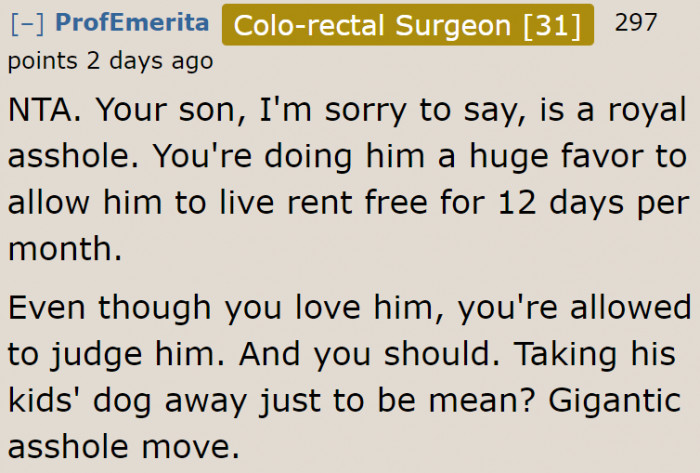
Navigating Family Conflicts
Conflict resolution specialists emphasize that family members should work together to establish shared values regarding pet ownership.
Research indicates that when families openly discuss their values, it can reduce misunderstandings and strengthen familial bonds.
The Role of Empathy
Empathy is crucial in navigating family dynamics and decision-making. Studies show that families who practice empathy tend to experience greater emotional connection and understanding.
In this case, fostering empathy between family members can lead to more harmonious discussions and decisions regarding the dog's welfare.
The OP is a good mother, a kind mother-in-law, and a cool grandma.

The ex-daughter-in-law is so lucky she has such a kind ex-mother-in-law.
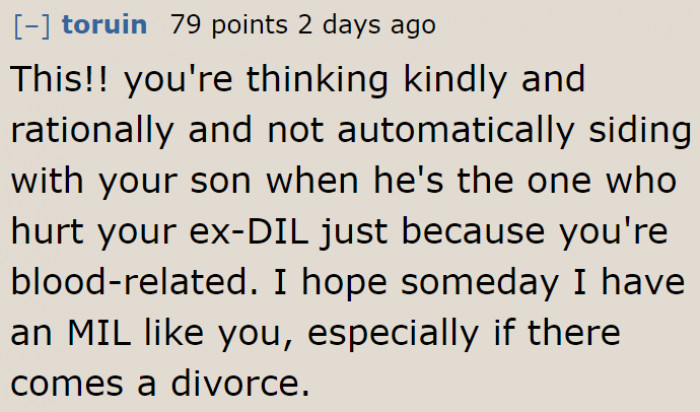
She did the majority a favor by returning the dog to the home where it will be loved.
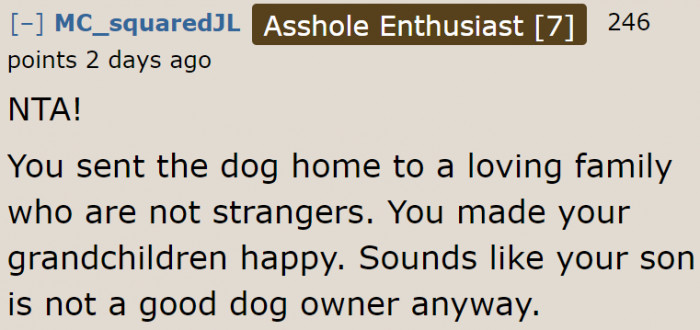
Implementing family meetings to discuss pet care and responsibilities can help ensure everyone feels included and valued.
This collaborative approach can prevent future conflicts related to pets and emotional attachments.
Families can benefit from engaging in exercises that promote empathy, such as sharing feelings about the dog’s welfare and its impact on family dynamics. Research indicates that such practices can enhance emotional understanding and reduce conflict.
Empathy can foster a supportive environment where family members feel valued and respected.
Why does he need leverage when he already has a girlfriend?
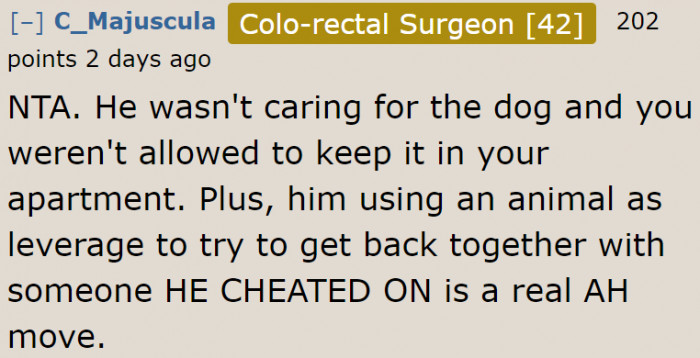
A microchip is always a good idea.
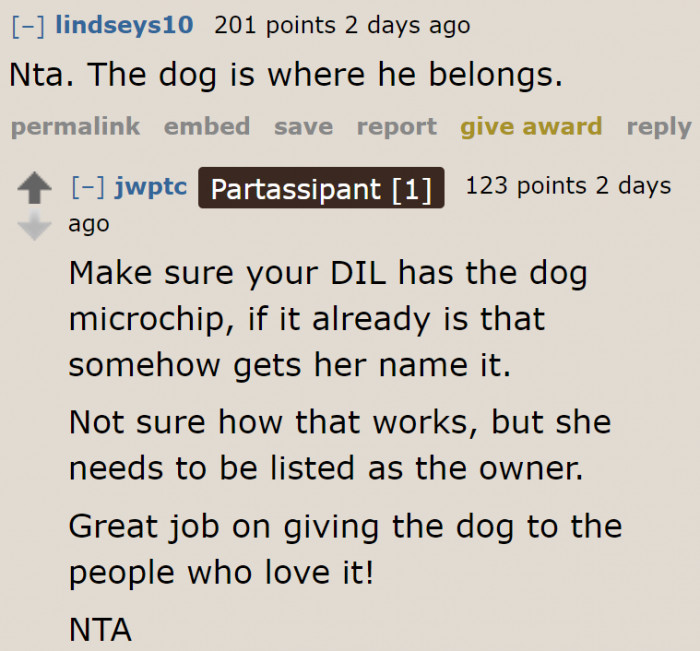
It was the best decision for the dog.
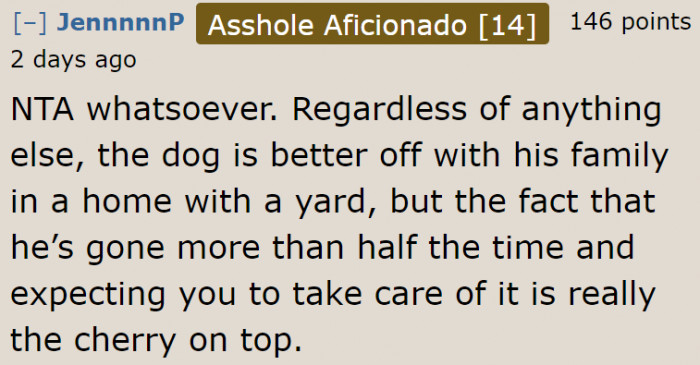
The Importance of Empathy
Empathy plays a vital role in navigating family conflicts, particularly concerning emotional attachments.
Psychological studies show that fostering empathy can significantly improve family dynamics and reduce conflicts.
Exploring Attachment Styles
This situation also highlights the importance of understanding attachment styles within family dynamics. Research indicates that individuals with secure attachment styles tend to navigate family conflicts more effectively.
Understanding one’s attachment style can provide valuable insights into behavior patterns and emotional responses during disagreements.
Redditors sided with the woman because giving the pet dog to her ex-daughter-in-law and grandchildren was the right thing to do. Although she loves her son very much, she chose to be rational by implementing tough love on him.
Now, the Border Collie is in a loving home with a family that will take care of it well.
Families should consider exploring their attachment styles and how they influence interactions. Engaging in open conversations about attachment can foster greater self-awareness and emotional regulation.
Research shows that individuals who understand their attachment styles are better equipped to navigate conflicts in healthier ways.
The Importance of Clear Communication
Finally, clear communication is essential in resolving conflicts related to family dynamics. Studies indicate that families who communicate openly experience greater emotional well-being and reduced conflict.
In this case, establishing common ground regarding the dog’s welfare can lead to healthier discussions and decisions.
Psychological Analysis
This situation illustrates the emotional challenges that arise from conflicting loyalties within families. It's important for family members to communicate openly about their feelings and responsibilities to prevent misunderstandings.
Developing a shared understanding of values can significantly enhance family dynamics.
Analysis generated by AI
Analysis & Alternative Approaches
These insights highlight the complexities of loyalty and responsibility in family dynamics. Understanding each other's perspectives, fostering empathy, and prioritizing relationships are crucial for healthy decision-making.
Ultimately, navigating these issues with compassion can strengthen family bonds.
Encouraging family members to practice empathy can help facilitate understanding and compassion during disagreements.
This practice can create a supportive environment where everyone feels heard and valued.
Understanding Emotional Reactions
Emotional reactions to perceived betrayals or losses often stem from unresolved attachment issues.
Research indicates that individuals with insecure attachment styles may react more intensely to perceived threats to their emotional security.
Analysis & Alternative Approaches
In summary, navigating family conflicts, especially those involving pets, requires understanding and empathy.
By fostering open communication and shared values, families can strengthen their bonds and navigate emotional challenges more effectively.



